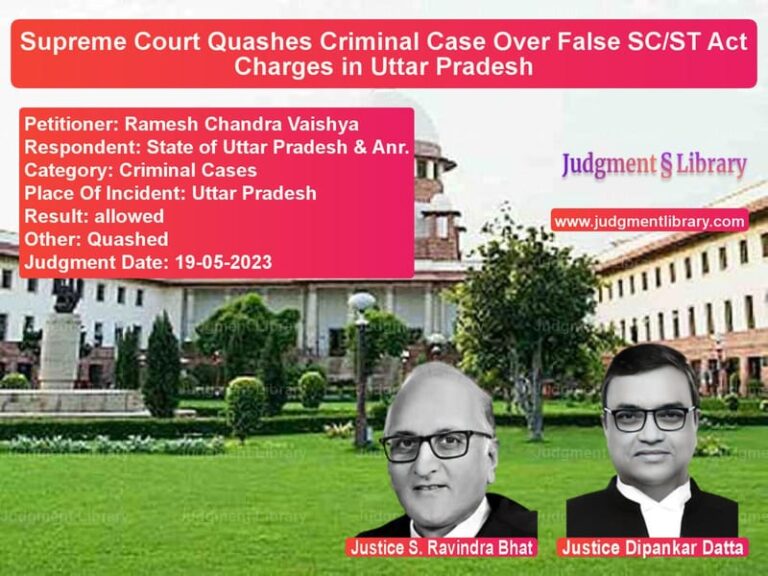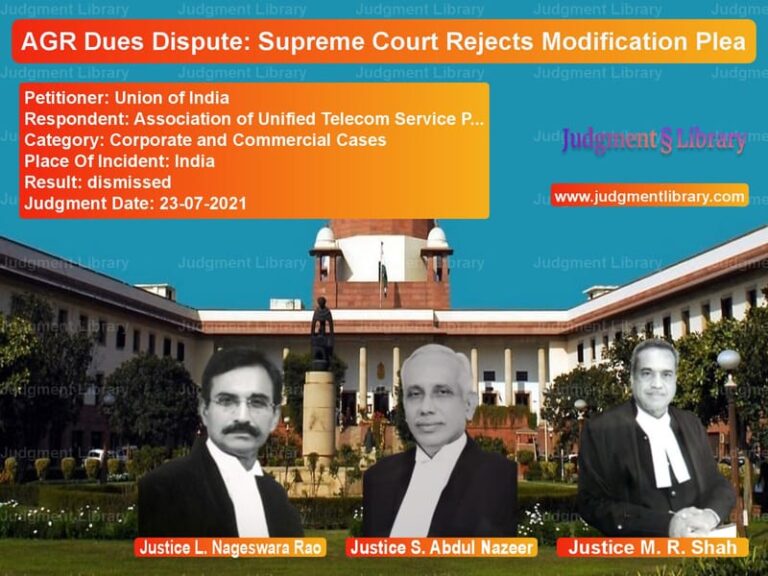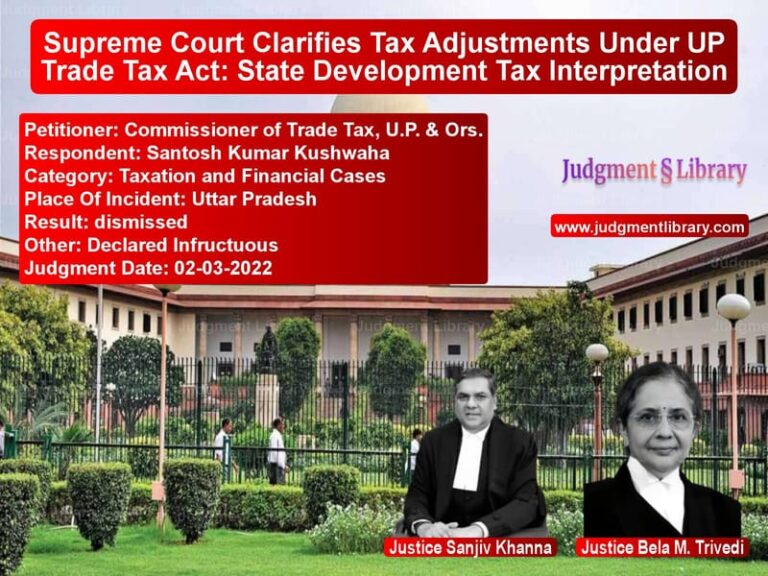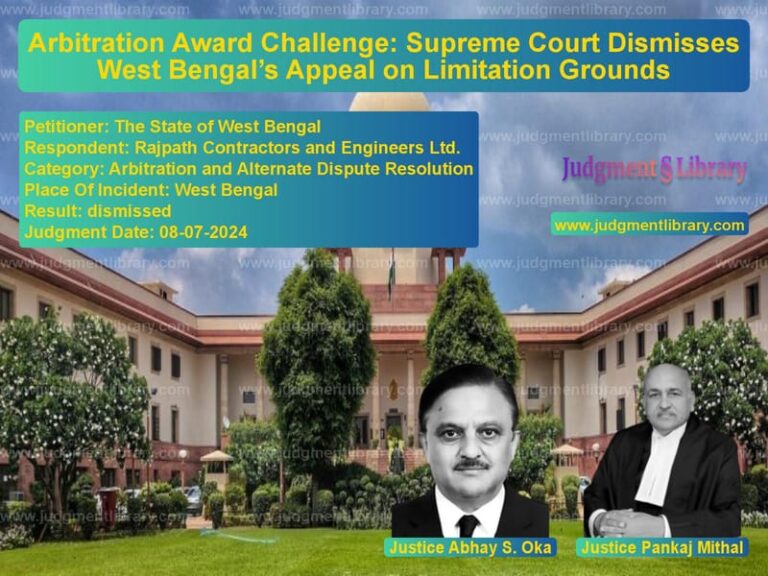Medical College Admission Ban: Supreme Court Orders Fresh Inspection for Compliance
The case of Varunarjun Trust & Anr. v. Union of India & Ors. revolved around the denial of recognition to a medical college due to deficiencies in faculty, infrastructure, and hospital facilities. The Supreme Court, in its judgment dated September 12, 2017, examined whether the Union Government and Medical Council of India (MCI) followed due process while debarring the college from admitting students for two academic years.
Background of the Case
The petitioner, Varunarjun Trust, applied for permission to establish a new medical college in Banthra, Shahjahanpur, Uttar Pradesh, under Section 10A of the Indian Medical Council Act, 1956. The Ministry of Health and Family Welfare forwarded the application to the MCI for evaluation. After an assessment conducted on January 12-13, 2016, the MCI reported severe deficiencies, leading to a recommendation against granting permission.
The Ministry provided a hearing to the college on February 25, 2016, but the Hearing Committee concurred with the MCI’s negative recommendation. A compliance verification assessment conducted on March 30, 2016, also found continued deficiencies. The Ministry accepted MCI’s recommendation and disapproved the application for the 2016-17 academic session on June 8, 2016.
Despite this, the Oversight Committee (OC) constituted by the Supreme Court directed the Ministry to reconsider the compliance submitted by the college. The OC conditionally approved the establishment of the college with an intake of 150 students for 2016-17. The Ministry issued a Letter of Permission (LOP) on September 12, 2016.
Following this, MCI conducted another verification on November 18-19, 2016, finding deficiencies again, including:
- Faculty shortage of 16.79%.
- Resident shortage of 21.73%.
- Only one minor operation recorded on the assessment day.
- Low ICU occupancy with only one patient each in MICU and SICU.
- Non-compliance with ICD X classification in the Medical Records Department.
- Library not being air-conditioned.
Based on these findings, MCI recommended debarring the college from admitting students for two years. The Ministry accepted this recommendation and issued an order on May 31, 2017. A fresh hearing was granted on August 16, 2017, but the Ministry upheld its decision on August 19, 2017, leading to the present appeal before the Supreme Court.
Legal Issues
- Was the MCI justified in debarring the institution based on its inspection findings?
- Did the Union Government provide adequate reasoning in its order?
- Should the Supreme Court intervene in expert regulatory decisions regarding medical education?
Arguments by the Petitioner (Varunarjun Trust)
The petitioner contended:
- The inspection by MCI was arbitrary and failed to consider compliance submissions.
- The deficiencies noted were either minor or had been rectified.
- The Oversight Committee had approved the college’s compliance, but the Ministry disregarded its opinion.
- The Ministry’s order was mechanical and did not provide specific reasons for rejecting the college’s submissions.
Arguments by the Respondents (Union of India & MCI)
The respondents argued:
- The deficiencies identified were severe and persistent, warranting regulatory action.
- The institution failed to meet the minimum requirements set by MCI, justifying the admission ban.
- The Supreme Court had consistently upheld stringent regulations for medical colleges to ensure quality education.
- Judicial review should not extend to overriding expert regulatory decisions unless they were arbitrary or perverse.
Supreme Court’s Analysis
On the Justification of MCI’s Decision
The Supreme Court ruled that MCI’s decision was well-founded, noting:
“The deficiencies found were significant and went to the core of medical education. The decision to debar the college was justified.”
On the Oversight Committee’s Opinion
The Court clarified that while the Oversight Committee’s opinion was relevant, it was not binding on the Union Government or MCI. It observed:
“The satisfaction of the Oversight Committee must be duly considered but does not override the statutory authority of the Union Government.”
On the Application of Judicial Review
The Court reiterated that judicial review does not extend to interfering with expert regulatory decisions unless there is clear evidence of arbitrariness. It stated:
“Courts do not sit in appeal over expert assessments. Unless the decision is manifestly arbitrary, judicial interference is unwarranted.”
On the Due Process Followed
The Court found that the institution was given multiple opportunities to present its case, and its deficiencies were thoroughly reviewed. It held:
“The college was given sufficient time to rectify its deficiencies but failed to do so. The impugned decision cannot be faulted.”
Final Judgment
The Supreme Court dismissed the petition, affirming the two-year admission ban and permitting MCI to encash the Rs. 2 crore bank guarantee. However, it allowed the institution to apply for recognition for the academic year 2018-19 and directed MCI to conduct a fresh inspection within three months.
“The applications submitted for 2017-18 shall be treated as applications for 2018-19, and the petitioners shall keep the bank guarantee deposited with MCI alive.”
Conclusion and Impact
This ruling underscores the Supreme Court’s commitment to maintaining high standards in medical education. The key takeaways from this judgment are:
- Regulatory authorities have the discretion to debar institutions that fail to meet the prescribed standards.
- Judicial review does not extend to overriding expert regulatory decisions unless they are manifestly arbitrary.
- Medical colleges must ensure full compliance with infrastructure and faculty requirements to avoid regulatory action.
By upholding the admission ban, the Supreme Court has sent a strong message that medical institutions must adhere to regulatory norms to ensure quality education and public health safety.
Don’t miss out on the full details! Download the complete judgment in PDF format below and gain valuable insights instantly!
Download Judgment: Varunarjun Trust & A vs Union of India & Ors Supreme Court of India Judgment Dated 12-09-2017.pdf
Direct Downlaod Judgment: Direct downlaod this Judgment
See all petitions in Recruitment Policies
See all petitions in Public Sector Employees
See all petitions in Legal Malpractice
See all petitions in Judgment by Dipak Misra
See all petitions in Judgment by Amitava Roy
See all petitions in Judgment by A M Khanwilkar
See all petitions in dismissed
See all petitions in Remanded
See all petitions in supreme court of India judgments September 2017
See all petitions in 2017 judgments
See all posts in Service Matters Category
See all allowed petitions in Service Matters Category
See all Dismissed petitions in Service Matters Category
See all partially allowed petitions in Service Matters Category







